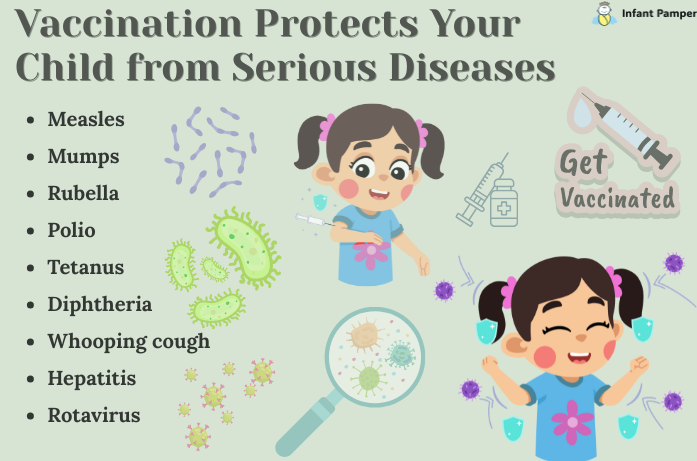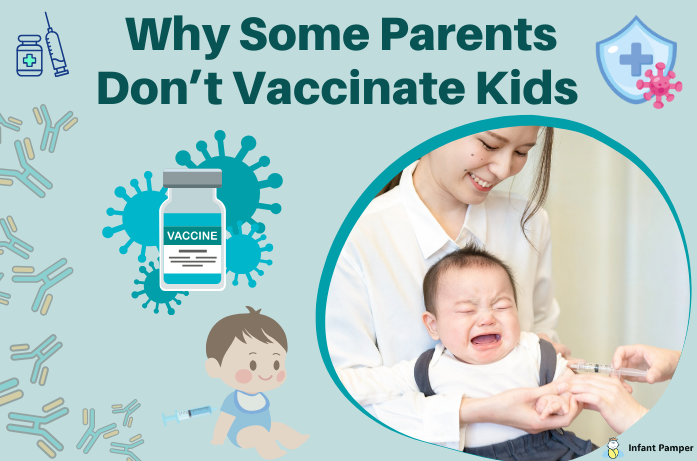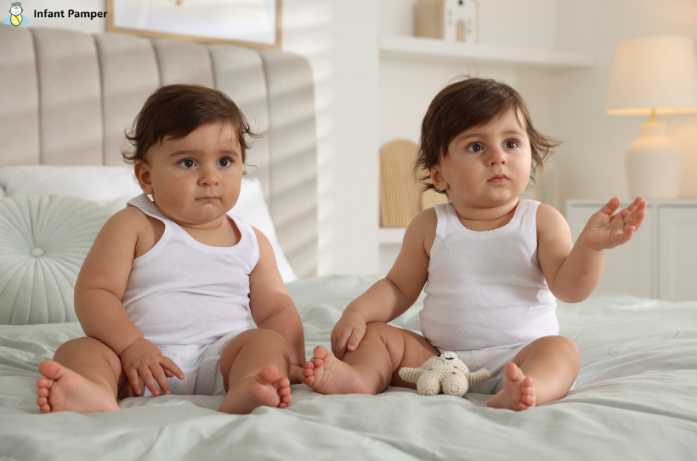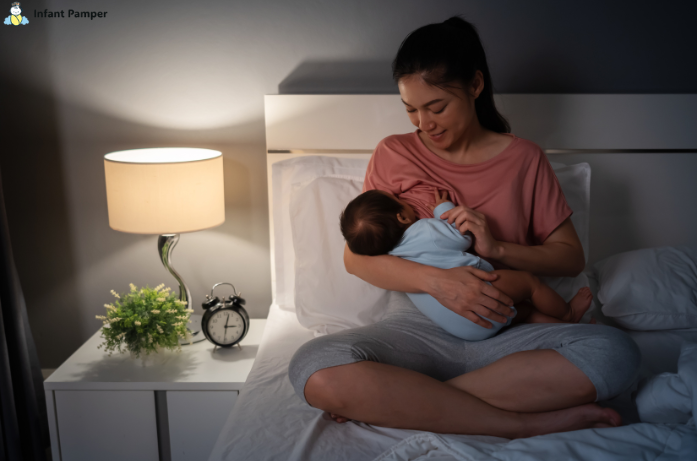By the Infant Pamper Team
Becoming a parent means making decisions every single day, what your child eats, how they sleep, and what’s best for their health. One of the biggest choices new parents face is whether or not to vaccinate their children.
Vaccinate Kids have been around for decades and are widely recommended by health experts across the world. But not all parents feel confident about them. Some are unsure, some delay, and some choose to skip certain vaccines altogether. If you’re one of those parents with questions, you are not alone and are also justified in asking them.
This article explains why some parents don’t vaccinate their children, the real benefits of vaccination, and what every caregiver should know before making an informed decision.
1. Risk of Side Effects
Many parents consider vaccine side effects in children to be of potential danger after vaccination. They might involve mild symptoms like slight fever, soreness, or swelling at the injection site. At best, these are extreme discomforts that come and go within a day or two.
Serious side effects are extremely rare. The CDC states that life-threatening allergic reactions are estimated to occur at less than one-per-million vaccine doses. Most children are able to receive vaccines with no adverse reaction.
2. Misinformation and Rumors
It’s easy to stumble across scary stories online linking vaccines to things like autism. But decades of research from trusted doctors and organizations have shown again and again, vaccines are not linked to autism. As stated by both the World Health Organization and the American Academy of Pediatrics, there is no connection between vaccines and autism.
In fact, the original research study that sparked the vaccines and autism myth was proven fraudulent and has been formally retracted. Nevertheless, the spread of vaccine misinformation online still causes doubts for many parents.
3. “Natural Immunity” Beliefs
Some parents believe that letting children get the illness-the diseases like chickenpox or measles is better than vaccinating. While, of course, natural infection would lead to immunity, the dangers from such an infection are much higher and possibly life-threatening.
For example, measles can cause brain swelling, while chickenpox can introduce severe skin infections or hospitalizations. The vaccine, however, assures one the same kind of protection minus the threats of life-threatening illness.
4. Religious or Personal Beliefs
In some families, religious teachings or personal philosophies discourage medical interventions such as vaccinations. Although every family is entitled to its own beliefs, it is important to understand that unvaccinated children can inadvertently spread diseases, especially to infants, the elderly, or people with weakened immune systems.
Unvaccinated children do not impact one isolated child. The effects can be felt in the community at large.
5. Distrust in Government or Pharma Companies
Some parents hesitate because they don’t fully trust big companies or government agencies. That’s understandable, trust has to be earned. But it helps to know that vaccine research is done worldwide by independent scientists, not just one company or group.
Such agencies like the Food and Drug Administration (FDA) and the CDC do uphold a strict regime of safety standards and efficacy studies on every vaccine well before it is available for administration to your child’s doctor.
The Real Benefits of Vaccination
Now, turning to the good side-the reasons vaccines get a widespread recommendation, and how they help not just your child but also those around him or her.

1. Vaccination Protects Your Child from Serious Diseases
Vaccines protect against:
- Measles (Rubeola)
- Mumps
- Rubella (German measles)
- Polio (Poliomyelitis)
- Tetanus (Lockjaw)
- Diphtheria
- Pertussis (Whooping cough)
- Hepatitis B
- Rotavirus
- Chickenpox (Varicella)
These, by the way, are not just old-time diseases. Some still prevail today. Without vaccines, children would have way higher chances of complications, hospitalizations, and even death.
2. Prevents Disease Outbreaks in Communities
When almost the entire population is vaccinated against certain diseases, one almost never sees an opportunity for the diseases to spread; this concept is called herd immunity.
Herd immunity protect:
- Newborn babies who are deemed too young to receive the vaccine
- Kids with cancer or autoimmune conditions
- The elderly with their waning immune systems
By vaccinating your child, you’re not just protecting them; you are also supporting everyone around them.
3. Saves Time and Money
- It is so expensive to treat diseases that can be prevented through vaccination; it’s expensive with hospital stays or with medicines or with lost days of work.
- Additionally, vaccines prevent these unexpected costs by preventing the occurrence of the diseases themselves.
- The cost of prevention is usually much lower and less stressful compared to that of cure.
4. Safe and Tested Scientifically
- Clinical trials and years of laborious studies go into creating vaccines.
- When accepted based on trials, vaccines undergo monitoring for their safety and efficacy.
- National and international bodies, such as FDA, CDC, and WHO, maintain standards for vaccine testing throughout the world.
5. Global Achievements
- Smallpox is reduced, thus saving many lives.
- Polio nearly eliminated worldwide thanks to the Global Polio Eradication Initiative.
- Due to massive immunization programs, deaths due to measles have decreased sharply.
These are some instances showing how vaccines have made a significant impact on the success of public health around the globe.
What Happens in Case Children Are Not Vaccinated? Skipping vaccines can lead to serious consequences for your child and others. Here’s what’s at risk:
- Greater Risk of Illness: Kids without vaccinations are prone to contracting hazardous diseases like measles, polio, or whooping cough.
- Harm to Vulnerable Groups: Infants, senior citizens, and all those having weak immune systems depend on others’ vaccinations to remain safe.
- Limitations at Schools and During Travels: In times of outbreak, many schools and countries require vaccination records for admission and travel.
- Community Outbreaks: Low vaccination rates can lead to disease outbreaks in schools and public places.
- Silent Spread of Infection: Healthy kids can carry an illness and pass it to others without realizing it.
When you vaccinate your child, you protect your child and those around your child.
Not Sure About Vaccines? Here’s How to Decide With Confidence
it’s important to feel informed and comfortable about your choice. A few simple steps to making a well-thought-out decision you can feel confident about are:
1. Start with Your Pediatrician
Your child’s doctor is your best guide. They’ll explain what each vaccine does, when it’s needed, and what to expect. No pressure-there are only honest answers to make you comfortable.
2. Look at the Right Information
The internet can provide unnecessary confusion. Avoid random posts and go straight to reputable sites made for parents:
- (CDC) Vaccines for Children Program
- (UNICEF) Child Health & Immunization Programs
- (AAP) American Academy of Pediatrics
These sites give you facts you can trust, without the drama.
3. Ask Every Question on Your Mind
When in doubt, good question! Go ahead and ask anything you want when it comes to your child’s health, anytime if it is something casual or serious. This is how you learn and confidently make your decision.
FAQs About Childhood Vaccines
1. Are vaccines safe for my child?
Yes. Vaccines have been tested thoroughly and are still monitored. Most side effects can include things like an arm being sore or having a low-grade fever.
2. Do vaccines cause autism?
No. Vaccines and autism have been found not to be linked by many large studies.
3. What if my child missed a vaccine?
Your doctor can help with a catch-up schedule. It’s okay, just don’t delay too long.
4. Why are vaccines given so much earlier to babies?
Because they have developing immune systems and need protection immediately.
5. Can my child be given more than one vaccine at a time?
Yes, it is considered safe and quickens the child’s protection while saving from having extra visits to the doctor.
Final Thoughts: Your Child, Your Choice but Know the Facts
Parenting is not about trying to get things right all the time, but about making the finest decision with whatever information available at all times. Vaccines are one of the strongest weapons that we can use to protect children. But we understand that trust needs to be generated.
At Infant Pamper, we encourage you to stay curious, stay informed, and stay kind to yourself during this journey.
Medical Disclaimer: This article is not intended as medical advice. Please consult your pediatrician for recommendations specific to your child’s health needs.




